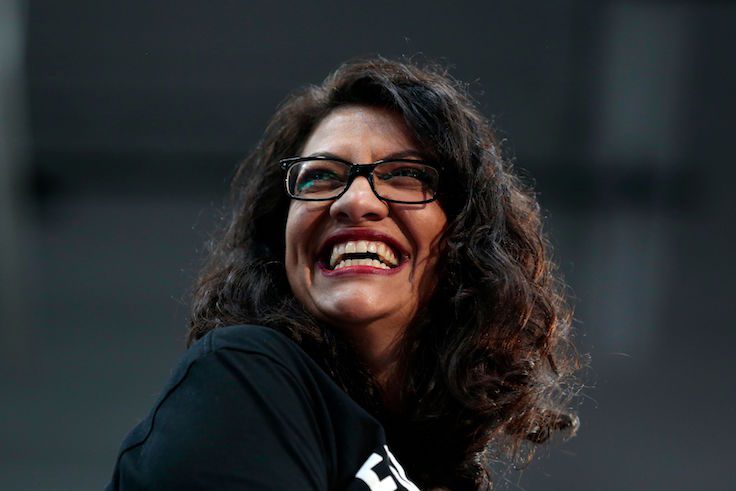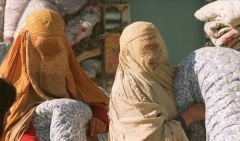Rent Cancellation Advocate Rashida Tlaib Cleaned Up as Landlord During Pandemic
'Squad' member collected rent as she vilified landlords

Rep. Rashida Tlaib (D., Mich.) collected up to $50,000 in rent payments last year, even as she publicly criticized landlords and supported an eviction moratorium that has hurt other small landlords.
Tlaib—who in December stressed the need to protect Americans from "landlords and bill collectors in the midst of a pandemic"—disclosed in an annual financial statement this month that she took in between $15,000 and $50,000 in rent on a Detroit property.
Tlaib is not the only "Squad" member who has raked in thousands of dollars as a landlord. Rep. Ayanna Pressley (D., Mass.) collected up to $15,000 in rental income in both 2019 and 2020 through a Boston property she owns, her financial disclosures show. Like Tlaib, Pressley slammed landlords for collecting rent during the pandemic, calling the issue "literally a matter of life and death."
While Tlaib collected rent from her tenants, other small landlords in the United States have not been so lucky. Numerous reports have detailed small landlords' struggles to make ends meet amid the eviction moratorium, which Tlaib has supported since early last year. The Centers for Disease Control and Prevention implemented a ban on evictions last September. The Biden administration extended the eviction freeze through October of this year.
Tlaib, Pressley, and other "Squad" members introduced legislation to cancel rent and mortgage payments. The bill would require the federal government to reimburse landlords for lost rent during the pandemic, allowing Tlaib and Pressley to recoup any potential losses.
"Cancelling rent and mortgage payments for the duration of the COVID-19 virus pandemic would relieve financial pressure, allow residents to stay home from work without the added concern of losing their housing and limit the spread of the virus," Tlaib said in March 2020.
Tlaib has at times portrayed landlords as preying on their renters.
"Always tons of agreement for tools of war and destroying families abroad, but never this much enthusiasm for protecting American families at home from landlords and bill collectors in the midst of a pandemic," she tweeted in December.
Tlaib did not disclose the address for the rental property on her financial statement, though details from her filings and local real estate records obtained by the Washington Free Beacon suggest she purchased the property using a $118,600 loan in 2016. Two years later, Tlaib listed the property for $2,000 a month rent before lowering the asking price to $1,800. Assuming Tlaib has not changed the monthly price, she collected rent for at least eight months in 2020, meaning she received payments throughout the pandemic.
According to local real estate records, Tlaib refinanced the three-bedroom home as a multifamily investment property in April 2019. The designation requires the Democrat to maintain rent loss insurance.
Neither Tlaib nor Pressley returned requests for comment.
Don’t Call it Shari’a, CAIR Official Says of the Taliban’s Ideology

(CNSNews.com) – The Taliban’s takeover in Afghanistan has thrust the issue of “shari’a” back into the public discourse, and a senior official in the Council on American-Islamic Relations (CAIR) said Tuesday the concept was being misunderstood and incorrectly portrayed.
When the fundamentalist militia ruled most of Afghanistan until it was toppled in 2001, its treatment of minorities, especially women, horrified the outside world.
Women and girls were denied education, strict dress codes were enforced, the vast majority of women were prohibited from working outside the home, and women were “subjected to rape, kidnapping, and forced marriage,” the State Department reported at the time.
Many fear the Taliban’s return will mean a comeback of such policies, which aligned with the Taliban’s interpretation of shari’a.
On Tuesday, Taliban spokesman Zabihullah Mujahid told reporters that the group would respect women’s rights “within the limits of Islam.”
According to the BBC’s translation of his remark, he said, “Our women are Muslims, they accept Islamic rules. If they continue to live according to shari’a, we will be happy, they will be happy.”
In a Facebook Live conversation, CAIR deputy director Edward Ahmed Mitchell put on screen a Fox News headline reading in part, “Taliban poised to impose Sharia law in Afghanistan.”
“The thing that Fox is doing here, quite deliberately, right, is that they want to declare that the Taliban’s understanding of how to enforce Islamic and uphold Islamic tradition, is the definitive definition of shari’a,” he said.
Mitchell said interpretations of shari’a vary between different schools of thought, countries and cultures.
While all Muslims believe they must follow the Qur’an and teachings of Mohammed, he said, “how we understand what those teachings are and what they require in different times and places and circumstances can vary.”
Mitchell’s guest, Islamic affairs scholar Anjum A. Ali, said shari’a was often “mistermed as Islamic law, but it’s a lot more than that.” She described it as a way of “living a life of ethical and moral principles” and a “guidebook” or “navigation system.”
None of the Islamic countries around the world “have any form of authentic and authoritative status on what Islamic law, or what shari’a is,” she said.
The laws of those countries had changed over time, informed by culture, history, experiences of colonialism, and that is why there were such drastic differences between them.
Ali said today’s Islamic governments included “dictatorships, despotic governments, complex political-economic situations, and none of them are healthy.”
“So to tell me that any of them represent shari’a is 100 percent false.”
She said the Taliban has “a perverted, distorted concept of how to make society the way they want, with a very controlling methodology.”
Mitchell’s message to Muslims was that they should take back their terminology.
“When you see people misuse our terms, jihad, shari’a, caliphate, khalifah – those words belong to us,” he said. “They don’t belong to Fox News, they don’t belong to anti-Muslim bigots. Those words are our community’s words, we get to define what they mean.”
CAIR describes itself as the nation’s biggest Muslim civil rights and advocacy group.
Asked for the administration’s view on the Taliban comments about women’s rights, National Security Advisor Jake Sullivan told a briefing at the White House, “We’ll see what the Taliban end up doing in the days and weeks ahead. And when I say ‘we,’ I mean the entire international community.”
A reporter asked what “tools” the U.S. has to ensure the Taliban does respect the rights of women, Sullivan cited sanctions, “marshalling international condemnation and isolation,” and “other steps” which he did not elaborate on.
He said the U.S. and other governments will be having conversations with the Taliban about “both what the costs and disincentives are for certain types of action and what our expectations are.”
Whether different Islamic countries practice different interpretations of shari’a or not, the fact remains that the countries where women struggle most are often Islamic countries.
In the 2020 annual World Economic Forum’s “Global Gender Gap” survey, of the 25 countries at the bottom of the rankings – positions 120 to 153 – 23 are members of the Organization of Islamic Cooperation bloc. (The exceptions are Bhutan in 131st and Democratic Republic of Congo in 149th place.)
The bottom-ranking ten countries are (from the bottom): Yemen, Iraq, Pakistan, Syria, DRC, Iran, Chad, Saudi Arabia, Lebanon, and Oman.
The survey examines differences between men and women in four specific areas – political empowerment, economic participation and opportunity, educational attainment, and health and survival.
No comments:
Post a Comment